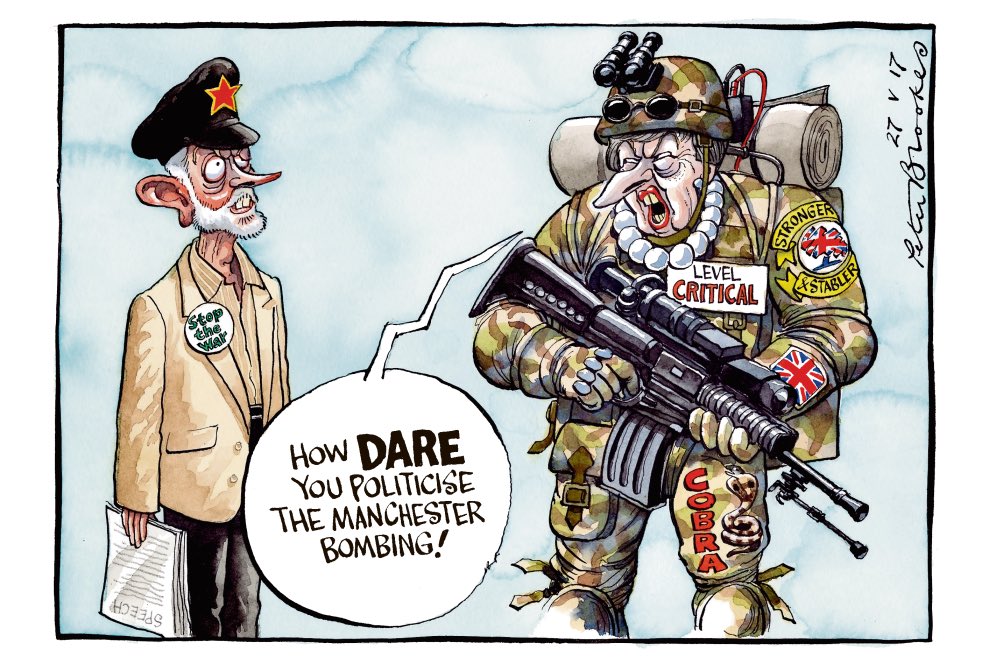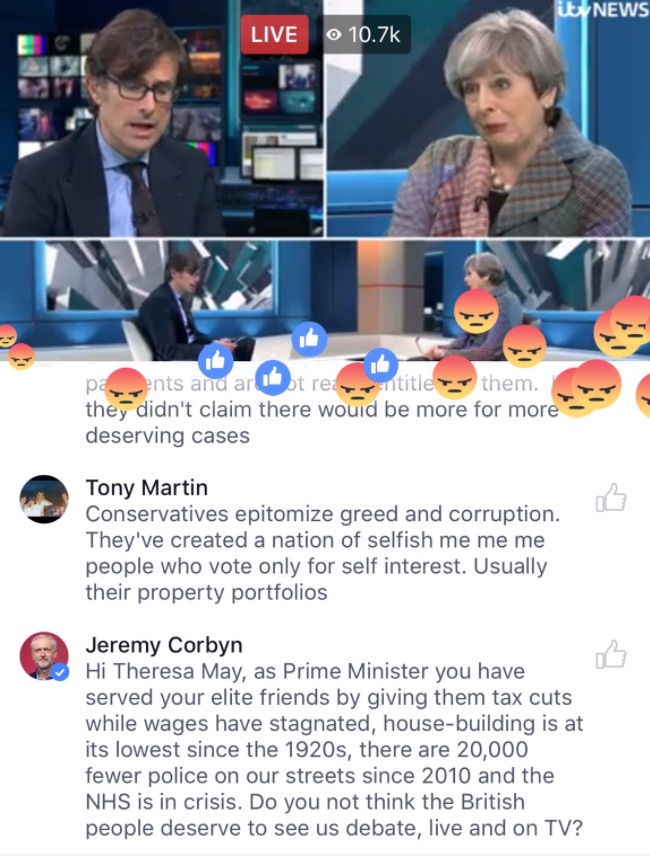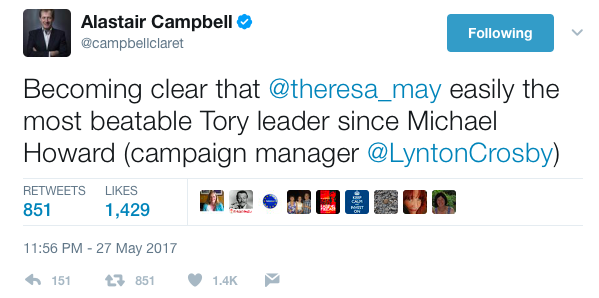As the UK election heads into its final stretch, the image and performance of the party leaders have taken on a fresh importance – particularly after the tragic events in Manchester.
When national political campaigning resumed on Friday after a three-day suspension in the wake of the Manchester Arena attack, it was a very different election contest. The remaining days until June 8th will inevitably be framed within the context of the bombing and the debate over national security.
In the aftermath of the attack, Theresa May was able by virtue of her incumbency to project statesmanship, reading a solemn statement at a lectern outside Downing Street that included lines like “our values will prevail.” She could move from Cobra meetings to the Nato and G7 summits, and – surrounded by the trappings of office – present an image of resilience and authority.
Jeremy Corbyn, meanwhile, was being forced to address his past relationship with the IRA, who of course had targeted Manchester with a bombing in 1996. His foreign policy response to the current situation was met with what The Guardian called “an extraordinary attack” by May and other senior Tories aimed at clearly differentiating the two leaders on terrorism and security.

Cartoon by Peter Brookes, originally posted in The Times on Saturday 27 May
But since the Prime Minister had already subsumed the Conservative party brand into her own personal image, the difficulty for the party is that she bears more of the personal burden for success or failure. And that’s becoming a source of some jitters.
Polls taken after Manchester remain largely inconclusive as to final electoral implications, but have shown a definite trend, suggesting that the previously predicted Tory landslide might be in doubt.
A YouGov poll on Friday caused some alarm in Tory circles when it showed their lead had dropped from 22 points to just five in three weeks. But another poll the following day for The Independent had the gap back up to 12 points, and May clearly ahead – although with a reduced lead – on being “Most likely to keep Britain safe from terrorism”, “Best to represent Britain on the world stage” and “Best to lead Britain’s negotiations over Brexit”.
On Sunday, an ICM poll for The Sun had an even wider lead, at 14 points on the back of May’s “strong handling” of the crisis, while an Opinium poll in The Observer, had a Tory advantage of 10 points, but showed significantly differing opinions of the two leaders. More than a third (37%) of those questioned said their opinion of May was more negative than at the start of the campaign, against 25% who said it was more positive. For Corbyn, 39% were more positive and 14% more negative.
An Orb poll for the Sunday Telegraph has Labour just six points behind and, interestingly, shows a “surge” in women voters backing Corbyn.
Tonight the two major party leaders will appear in front of a studio audience and face questions from veteran interviewer Jeremy Paxman in a broadcast that will be carried live on both Channel 4 and Sky News.
Sky has been promoting the show almost like a UFC bout (breathlessly billing it “May v Corbyn – The Battle for Number 10”) but of course the two literally won’t lay a glove on each other, since they’ll appear back-to-back rather than on the same stage at the same time. Corbyn – who has never been interviewed by Paxman – will go first.

Jeremy Corbyn joins the conversation on Facebook
There’s always an element of uncertainty about any live event – especially in politics – and if you doubt how even the smallest, seemingly insignificant detail can have a big effect, think back to how Bill Clinton got the upper hand on George H.W. Bush when the incumbent President checked his watch in the middle of their debate in 1992.
Toby Helm wrote in The Observer this weekend how Mrs May’s handlers had agreed earlier in the campaign to tonight’s format, and also the BBC Question Time this coming Friday, as safe options which would also defuse criticism that she was avoiding debate situations.
That criticism had gotten to the point where Corbyn even hijacked May’s televised Facebook chat with ITV’s Robert Peston – the first by a party leader – to challenge her to a debate. Her response? “I don’t think people get much out of seeing politicians having a go at each other.”
Certainly, if this week’s Andrew Neil TV interviews were anything to go by, both leaders found themselves digging in and playing a very straight bat against some good probing questions. They can expect nothing less from Paxman tonight, you’d think.
The Tories’ caution with May’s exposure has extended to putting up Home Secretary Amber Rudd in the PM’s stead for a seven-way party debate set for Wednesday night. No word yet on whether Corbyn will take part, or whether either leader will join the final all-party youth debate, scheduled for the BBC on June 6th.
So, limit the potential pitfalls, Helm wrote, and if they didn’t fall on the home stretch, May’s team figured they’d be home and dry:
Suddenly, though, the safety-first strategy does not look quite so safe. May’s campaign – centred on her and the supposedly reassuring theme of “strong and stable” leadership – has imploded. May’s brazen U-turn over social care last Monday, three days after announcing a firm policy in the party’s election manifesto, has fatally undermined the entire May-centric strategy in a way that Tory advisers failed to foresee.
According to the Daily Telegraph, the Conservatives are planning to further squeeze UKIP voters over the remaining days, pressing the idea that their vote for Brexit is in jeopardy, in a “relentless” push emphasizing an image of May’s reliable leadership.
That hasn’t stopped former Labour adviser Alastair Campbell trying to wind up Tory campaign chief Lynton Crosby with this tweet:

Psephologists might tell you polls always tighten towards the end of a campaign and that many voters often don’t fully engage with the contest until the final 72 hours.
Even in a post-Manchester context, though, where you’d be forgiven for thinking this election has already been completely upended, there is still plenty of time for surprises. And – in case you were thinking of giving tonight’s show a miss – live television is always a more likely place than most for them to happen.
* A full list of the remaining debates and Question Times is here.
